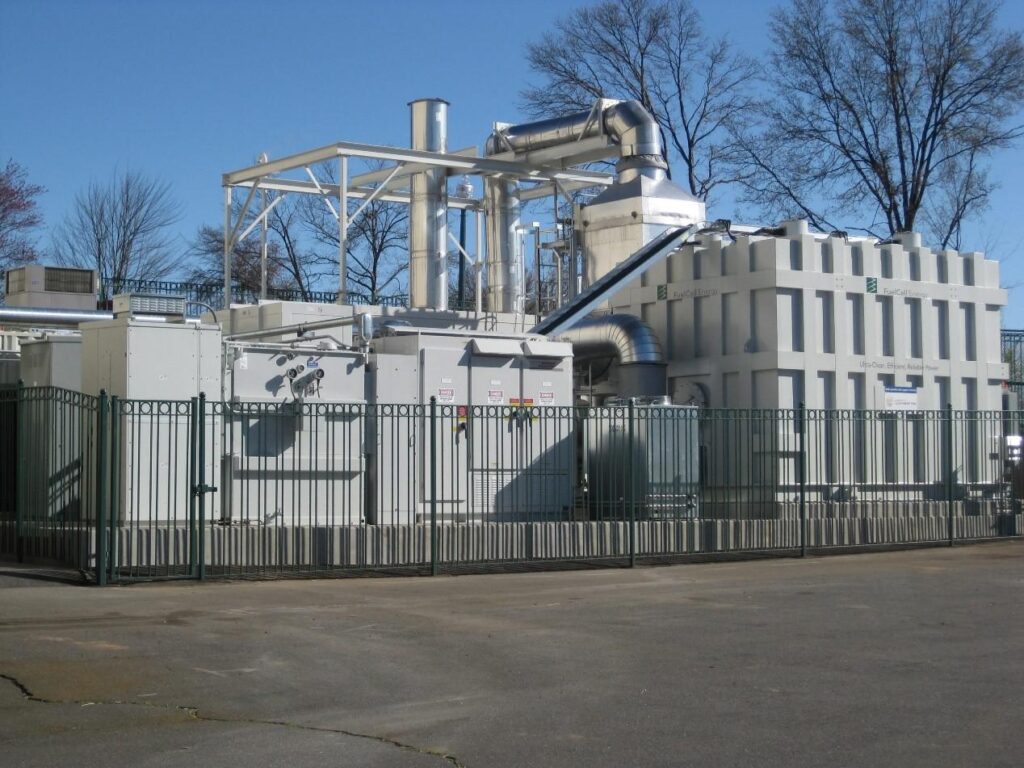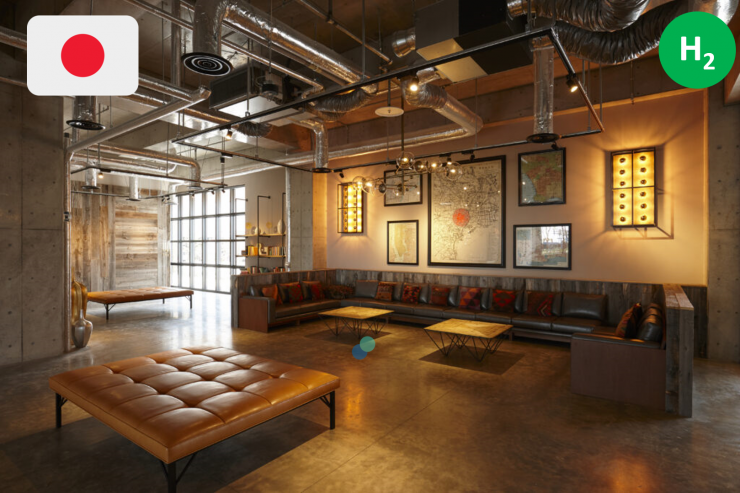
Hotels can install fuel cells in their premises generating electricity or co-generating heat and power covering part of their energy requirements. Installation of fuel cells in their premises increase their energy self-sufficiency and their energy resilience. This is important in the current era of climate change and of extreme weather events or when there are frequent power outages.
THE WORLD’S FIRST HYDROGEN POWERED HOTEL: AT THE FOREFRONT OF ETHICAL INNOVATION IN HOSPITALITY
Tokyu Hotels Group is leading the way in the hospitality industry with its approach to the use of hydrogen fuel in hotels. Hydrogen has been referred to as the ‘ultimate clean energy’, offering a solution for securing a stable energy supply and preserving the global environment. The Kawasaki King Skyfront Tokyu REI Hotel has created a sustainable model for its production in partnership with government entities in order to achieve a hotel which is 100% run on renewable energy. This innovative hotel has won prizes for its countermeasures against global warming, and continues to implement more environmentally friendly options into its operations. 30% of the hotel’s hydrogen power supply is sustained by plastic waste from Kawasaki. 450,000 kWh of power is generated per year. That’s the equivalent of providing electricity for 82 homes for one year. 200,000 kg of CO2 saved, that’s the equivalent sequestration of 14,300 cedar trees. The other 70% of the hotel’s energy is sourced from food waste. Pesticide free lettuces are planted in the hotel’s LED powered growers, using renewable energy. The Kawasaki King Skyfront Tokyu REI Hotel was opened as an ethically minded, welcoming hotel which is 100% powered by renewable energy, fitting in line with Kawasaki’s initiative to leave a greener footprint and comply with the country’s new growth strategy. Tokyu Hotels Group Using the concept that ‘simply staying at the hotel should be eco-friendly’, this stylish hotel is symbolic of the future with its uniqueness as the first hydrogen-powered hotel in the world. Whilst the hotel’s initial experiment as a fully renewable hydrogen powered hotel concluded on March 31st 2022, plans are in place for the hotel to reopen as a “hyrdrogen hotel” once again from January 2023. The hotel’s power supply is 30% sustained by plastic waste that is acquired locally from the city of Kawasaki, as well as plastics produced by the hotel, including used room amenities such as toothbrushes and hair combs. In one year, a total of 300,000 Nm3 of hydrogen is supplied, generating 450,000 kWh of power with a total CO2 reduction effect of about 200,000 kg. This is equivalent to providing electricity for 82 households of four people per day and reducing CO2 equal to that of 14,300 cedar trees, whilst supplying 30% of the hotel’s electricity, and utilizing the waste heat from the fuel cells as energy to heat water. In order to implement environmentally friendly hotel operations, the other 70% of Kawasaki King Skyfront Tokyu REI Hotel’s electricity is sourced from food waste. By participating in a project where food waste is methane-fermented by microorganisms, the biogas is used as fuel in an effort to eliminate food waste disposed of at hotels, in addition to generating fuel to use as electricity. In 2020, a ‘plant growing module’ was installed in the lobby, so that guests staying at the hotel could visually experience the effects of renewable energy. The plant module generates photosynthesis using an LED light source and hydroponics with a nutrient solution. As the total number of pesticide-free lettuces which can be planted at one time is 120, planting and harvesting is done in stages so that approximately 30-50 lettuces can be cultivated per week. ‘The world’s first hydrogen hotel’ will update the fuel cell unit and continue the generation of hydrogen power! From the technical demonstration, the Tokyu Hotel group will finally move on to the stage of social implementation. Whilst the above demonstration project ended on March 31, 2022, the hotel is currently not using hydrogen created from the hotel. However, Tokyu Hotel Group has been researching ways to maintain CO2 reduction. On September 15, 2021, the hotel was adopted by the Ministry of the Environment as part of the Ministry of the Environment’s project to promote the use of renewable energy-derived hydrogen to build a decarbonized society. A 50 kW pure hydrogen type stationary fuel cell power generation system manufactured by Meiji Electric Industry corporation using fuel cell (FC) modules manufactured by Automobile corporation will be introduced, and hydrogen power generation will continue as a “hydrogen hotel” again from January 2023. Tokyu Hotels Group is taking part in this initiative in order to inspire climate action in the hotel industry through the implementation of hydrogen. The Japanese hotel group plans to spread awareness by educating on the importance of clean and renewable energy through sustainable development goals-themed school trips to the facilities of the organizations which are contributing to the hotel’s hydrogen-based operations, as part of the next step.
Radisson Hotel Group (RHG) leads sustainability in the hotel industry, installing fuel cell technology that allows Radisson Blu Hotel, Frankfurt to generate its own energy.
RHG is setting new standards for sustainability in the hotel industry.
Thanks to a highly innovative decentralized solution, the Radisson Blu Hotel, Frankfurt in Germany is now able to generate its own energy. This achievement makes it the first hotel in Europe with a hydrogen fuel cell of industrial size, and the unique installation of the fuel cell technology is the first of its size in a hotel. We believe that the travel and hospitality industry (together with its partners) can be a force for good. It’s why we participate in significant collaborative initiatives to help build a better planet for all.
Our sustainability actions support the preservation of natural resources and the conservation of destinations, all while contributing to the bottom line and enhancing our ability to deliver the value our customers expect. In addition to RHG company-wide initiatives, we believe in piloting innovative solutions in the space of carbon footprint reductions, water stewardship and aiming for zero waste.
RHG’s Think Planet commitment is to reduce the group’s carbon footprint by 10% by 2022 (compared to our 2017 baseline) by reducing our energy consumption and increasing the use of renewable energy. Think Planet was designed and launched as a company-wide initiative in 2012, and helped RHG to reduce its energy consumption by 25% by the end of 2016.
Think Planet is the driving force behind the introduction of fuel cell technology to the Radisson Blu Hotel, Frankfurt. The installed fuel cell has a huge advantage over conventional power generation systems – generating electricity and heat in a non-combustion process, which is virtually absent of pollutants such as nitrous oxide or fine dust particles.
With more than 400 rooms and suites, the Radisson Blu Hotel, Frankfurt has enormous energy needs, which had previously been covered entirely by the power grid. Starting in late summer 2017, the fuel cells began to supply approximately 3GWh of electricity and 2GWh of heat to the hotel.
The highly efficient technology also allows the hotel to reduce CO2 emissions by about 600 tons a year. This amount is equal to the CO2 emissions from 50,000 cars driving 100 km. The use of fuel cell technology allows the hotel to generate a large share of the energy needed to run the hotel free of emissions.
